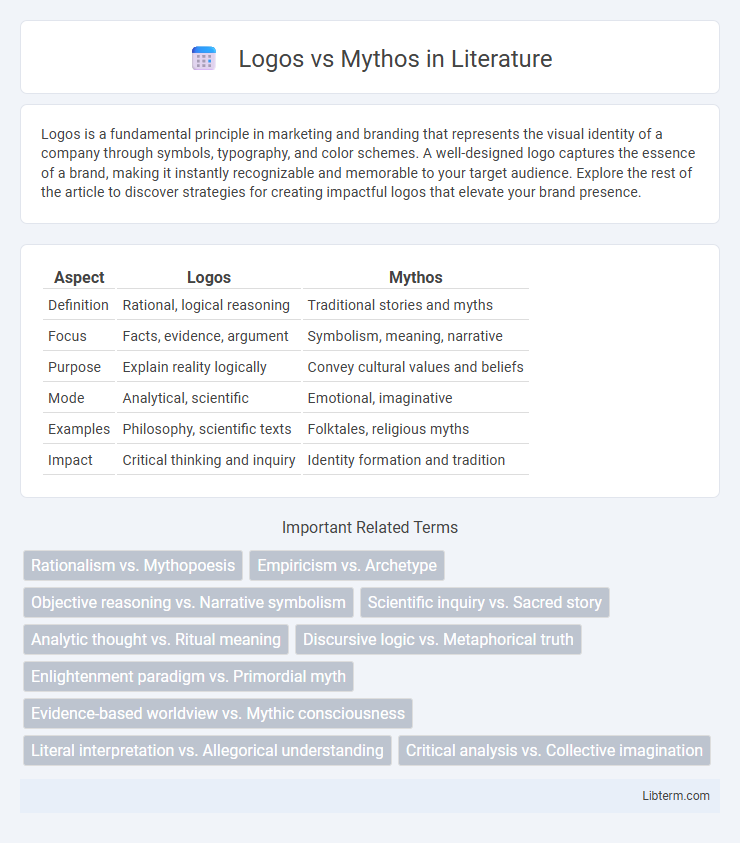Logos is a fundamental principle in marketing and branding that represents the visual identity of a company through symbols, typography, and color schemes. A well-designed logo captures the essence of a brand, making it instantly recognizable and memorable to your target audience. Explore the rest of the article to discover strategies for creating impactful logos that elevate your brand presence.
Table of Comparison
| Aspect | Logos | Mythos |
|---|---|---|
| Definition | Rational, logical reasoning | Traditional stories and myths |
| Focus | Facts, evidence, argument | Symbolism, meaning, narrative |
| Purpose | Explain reality logically | Convey cultural values and beliefs |
| Mode | Analytical, scientific | Emotional, imaginative |
| Examples | Philosophy, scientific texts | Folktales, religious myths |
| Impact | Critical thinking and inquiry | Identity formation and tradition |
Understanding Logos and Mythos: A Brief Overview
Logos represents logic, reason, and analytical thinking, serving as the foundation for scientific inquiry and factual understanding. Mythos encompasses storytelling, cultural myths, and symbolic narratives that convey values, beliefs, and collective human experiences. Understanding the distinction between Logos and Mythos highlights how rational analysis and mythological meaning coexist in shaping knowledge and worldview.
Historical Origins of Logos and Mythos
Logos, rooted in ancient Greek philosophy, emerged around the 6th century BCE with thinkers like Heraclitus who emphasized reason, logic, and rational discourse as ways to understand the world. Mythos, predating Logos, originates from oral traditions and ancient storytelling, conveying cultural values and explanations through myths and divine narratives in early human societies. The historical evolution of Logos marked a shift from mythological explanations to systematic inquiry and evidence-based knowledge in Western thought.
Philosophical Foundations of Logos
The philosophical foundations of Logos trace back to ancient Greek thought, where it signifies rationality, logic, and the principle of order governing the cosmos. Philosophers such as Heraclitus emphasized Logos as the universal reason underlying change and coherence in nature. This concept laid the groundwork for Western epistemology and metaphysics, distinguishing knowledge derived from reason and evidence over mythic or narrative explanations.
The Role of Mythos in Ancient Societies
Mythos served as a foundational framework for ancient societies, shaping cultural values, collective identity, and explaining natural phenomena through symbolic narratives. These mythological stories functioned as a vehicle for moral lessons, social cohesion, and religious rituals in civilizations such as Mesopotamia, Greece, and Egypt. Through oral tradition, mythos preserved communal wisdom and legitimized political power by connecting human experience to divine influence.
Logos in Modern Rational Thought
Logos, rooted in reason and logic, forms the foundation of modern rational thought by emphasizing empirical evidence, systematic analysis, and coherent argumentation. It drives scientific inquiry, technological advancement, and the development of objective knowledge frameworks that prioritize clarity and precision. The dominance of Logos in contemporary discourse fosters critical thinking and decision-making based on factual data rather than narrative or mythological explanations.
Mythos in Religion and Culture
Mythos in religion and culture serves as a foundational narrative framework that conveys beliefs, values, and traditions through symbolic stories and rituals. These mythological narratives shape collective identity, offering meaning and emotional resonance that transcend empirical reasoning. By embedding spiritual and moral lessons within allegorical tales, mythos fosters communal cohesion and cultural continuity across generations.
How Logos and Mythos Shape Worldviews
Logos, grounded in reason and logic, frames worldviews by emphasizing empirical evidence and systematic analysis, promoting scientific inquiry and rational thought. Mythos shapes worldviews through narrative, symbolism, and cultural traditions, providing meaning, values, and a shared sense of identity. Together, Logos and Mythos influence how societies interpret reality, balance knowledge with meaning, and navigate existential questions.
Tensions and Interactions Between Logos and Mythos
The tensions between logos and mythos arise from logos emphasizing rationality, logic, and empirical evidence, while mythos relies on narrative, symbolism, and cultural meaning. Interaction occurs when logos seeks to interpret or decode mythos, leading to reinterpretations of myths through scientific or philosophical lenses. This dynamic interplay shapes human understanding by balancing objective truth with subjective significance in knowledge systems.
Logos, Mythos, and the Search for Meaning
Logos represents rational thought, logic, and empirical evidence, serving as the foundation for scientific inquiry and analytical understanding. Mythos encompasses traditional stories, cultural narratives, and symbolic meanings that connect individuals to shared values and existential questions. The search for meaning often occurs at the intersection of Logos and Mythos, where empirical knowledge meets human experience, facilitating a comprehensive understanding of reality.
Integrating Logos and Mythos in Contemporary Discourse
Integrating logos and mythos in contemporary discourse enriches communication by blending logical analysis with narrative meaning, fostering deeper understanding and emotional resonance. This fusion allows speakers and writers to address both empirical evidence and cultural values, enhancing persuasion and engagement across diverse audiences. Emphasizing the complementarity of logos (reason) and mythos (story) supports more holistic discussions in philosophy, education, and media.
Logos Infographic

 libterm.com
libterm.com